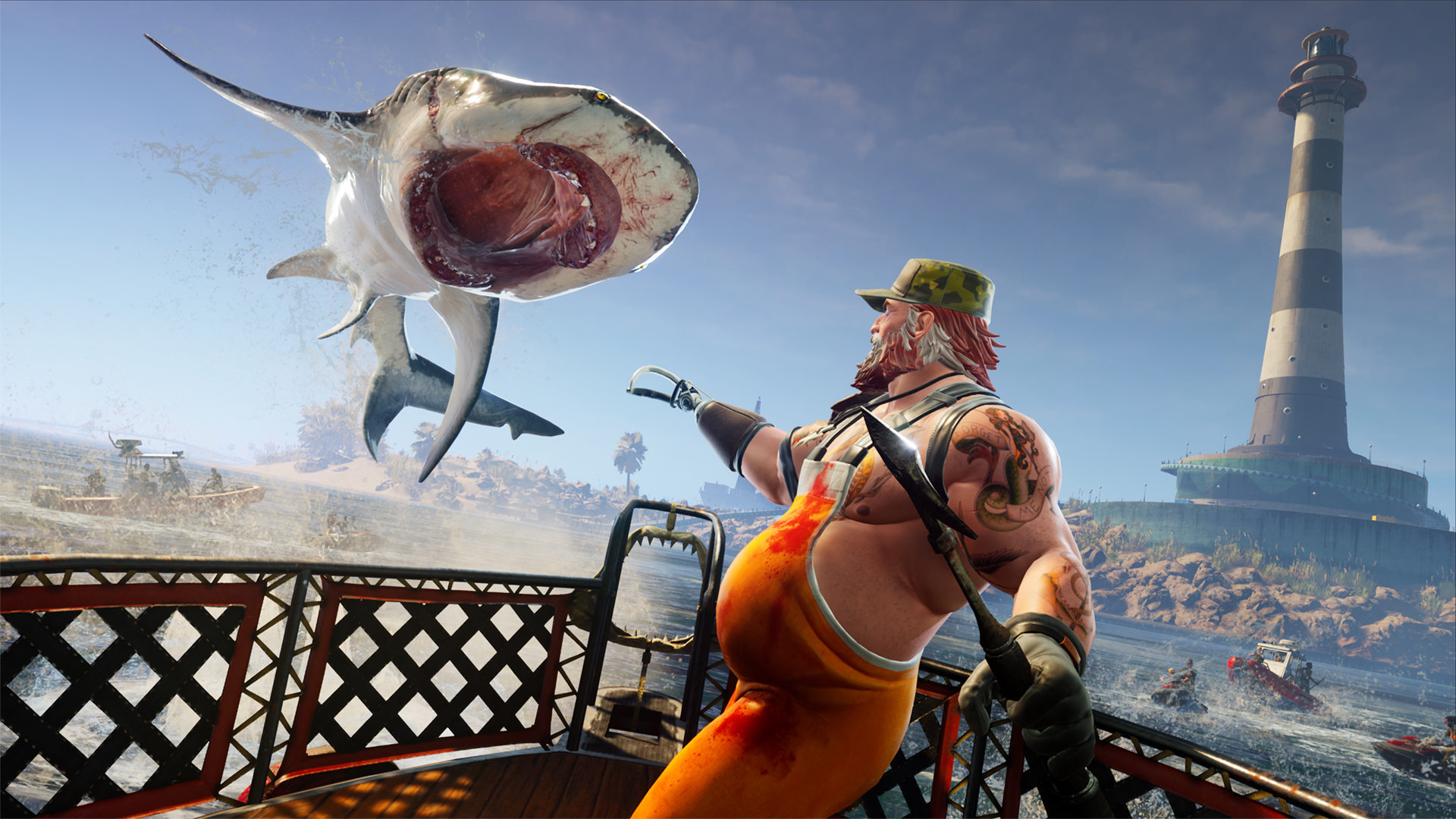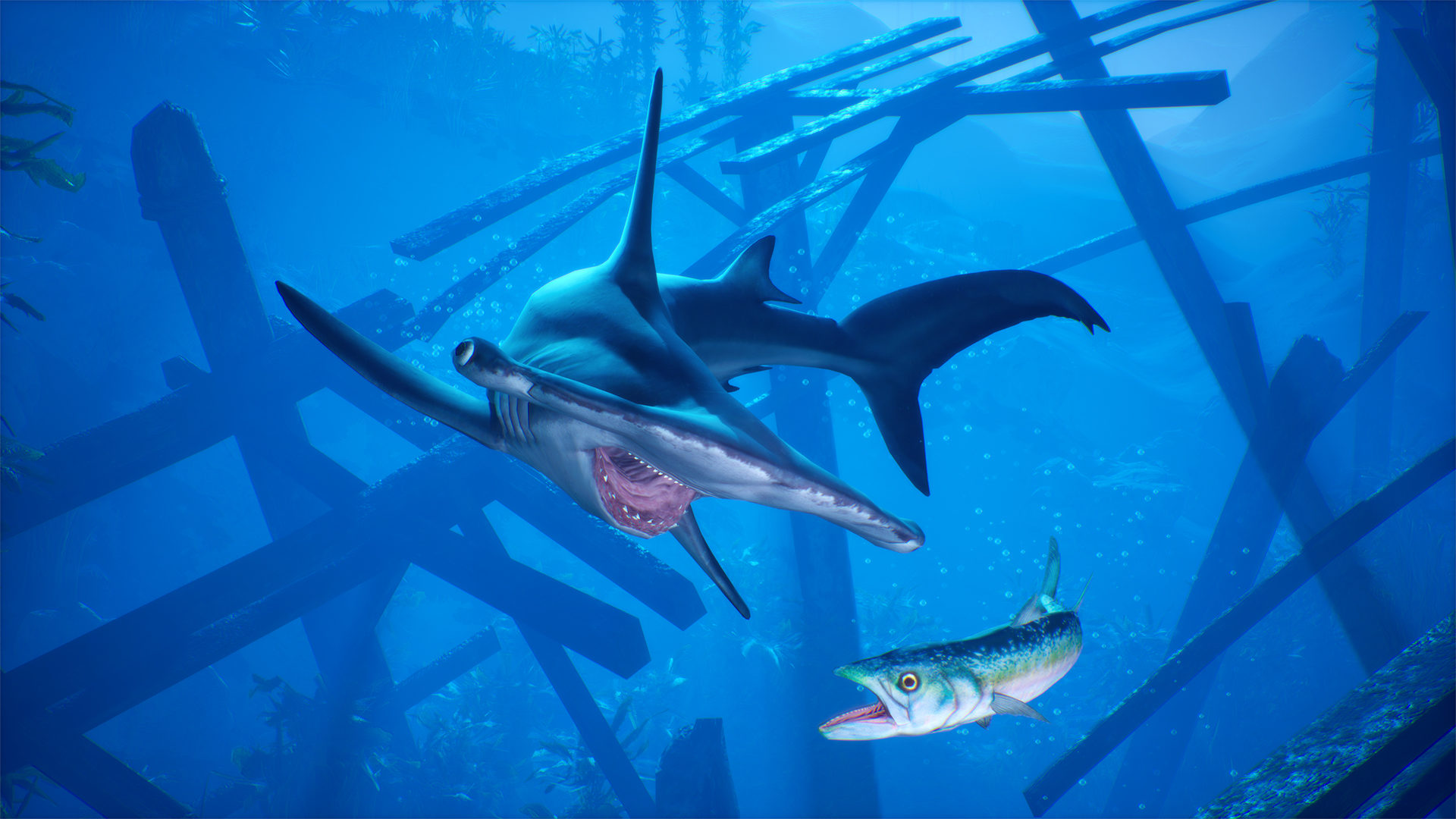Maneater is part of the lineage that includes Grand Theft Auto, Crackdown, and military shooters like Call of Duty and Battlefield. These are games that use mass murder as a gameplay foundation, and every method has its own potential ethical pitfalls. Rockstar made killing innocent people part and parcel of the sandbox experience, which is why art projects like Elegy can use Grand Theft Auto V as ruminations on American gun violence. Shooter series like Call of Duty and Battlefield go with the somewhat more palatable approach of setting their mass murder simulators in theaters of war, where young men and women are at least legally justified in killing one another, though that raises questions about how games can respectfully represent real-life conflicts in which millions of people gave up their lives. Then there’s a series like Crackdown, which provides the most self-effacing portrayal of mass murder in its satirical commentary on how the superpowered beings we worship view us normal citizens as little more than cannon fodder, even while ostensibly fighting to protect the law and order that keeps us safe. Crackdown even gets bonus points for making these superpowered beings police officers, whose proclivities for abusing their power and shooting first and asking questions later has finally found its way into the mainstream (i.e. “white people”) conversation.
Sometimes, there are the games that find a clever trick around this ethical minefield by casting players as something other than human. This is Maneater’s trick. You play as a shark bent on revenge, not only against a specific human, but against humanity as a whole. From the perspective of a shark whose mother was killed and whose environment has been perverted for the pleasure of humankind, committing mass murder isn’t simply justified—it’s a moral obligation. Maneater is one of the strongest cases of video game mass murder satirization since the original Crackdown. Unsurprisingly, it uses a lot of the same moves.
Maneater’s tone is a mix of B-movie horror and reality television, and the game uses a fake reality TV show, also called Maneater, as its framing device. Minus the competition angle, the in-game reality show is a parody of the misguided and short-lived Shark Hunters or the much more prevalent Deadliest Catch, which put forth the insane notion that human beings have the right to be the apex predator not only on land but also on the seas. It’s the sort of linear, power-driven mental framework that has propelled humanity into the nightmare reality of consumption and destruction as our god-given right.

Scaly Pete is Maneater’s Bayou version of Ahab, and Pete’s Moby Dick is the bull shark that killed his daddy. But unlike Ahab, Pete captures and kills that shark, though when he cuts it open he finds another shark—that shark’s baby, who takes his hand off after being cut out of her mother’s womb. Players take on the role of the baby shark, who grows into a teen shark, then an adult shark, and finally an elder shark, all the while taking more pieces of Scaly Pete with every encounter.
At first, the idea of having a story-driven “shARkPG” (as developer Tripwire Interactive refers to it) seems like an inherent contradiction. Sharks might have memories, but they don’t have the kinds of complex egos that drive humans towards self-destructive impulses like revenge. Completing “main objectives” and “side objectives” like you would in any other open-world game seems forced, especially when those objectives are so often repetitive: eat 10 seals, kill this special alligator, consume 15 humans. But these actions, which are unendingly narrated by Chris Parnell (Rick & Morty, SNL), are just natural impulses of the shark, given context through the framework of the fake reality show. The shark isn’t the one that’s conscious of how its actions propel the plot of the game forward; the player is, and it’s the player that projects the ego-driven motivations of the shark’s actions. Yes, there are checklists of objectives to complete and collectibles to find, but the shark doesn’t see them as objectives and collectibles—the shark sees them as nothing more than sustenance. It’s inadvertent, then, at least from the perspective of the shark, that completing these objectives spawns the boss fight for each region of the game’s perfectly sized map. The player, as the shark, is simply making its presence known.
The same justification works for the game’s RPG mechanics. Sharks eat, and they get bigger, they get stronger. Each animal you eat earns you specific resources that you can then spend on your different mutations (or upgrades), leveling you up and making you stronger, the same way that collecting agility orbs in Crackdown makes you jump higher, while shooting people makes you better at shooting. It’s the same system, and it’s satisfying in the same way, too. Of course, this creates a sort of ontological rift, in that real sharks don’t get electric powers or bone armor or “shadow” fins that allow them to emit poisonous clouds and slow time around them. But, you know, this is still a video game, played by humans, and we love our superpowers. Surprisingly, the game’s combat system cleverly maintains its inherent sharkness. The shark can bite, bash, tail-whip, and dodge, with each having its own counter-attacks and counter-counter-attacks. It takes a little while to get used to, but it adds a level of depth to the gameplay that maybe, sort of accurately represents the way a shark would fight in the wild. The only real problem with the combat is the camera, specifically the way the camera can only snap to a target without locking on to them. On the one hand, steering away from this action RPG staple of the lock-on mechanic respectably eschews a mechanical cliche, but on the other hand, that mechanic is a cliche for a really good reason.

Maneater’s greatest joy, though, is simply swimming around as a shark. Unshackled from the oppressiveness of human limbs, the player moves through the water with speed and grace, a perfect submersible machine, crafted by evolution. In these quiet moments of basic inertia and physics, the ego disappears. You are not you. You are shark.
But, as it goes with us humans, the ego comes roaring back in the form of Maneater’s gory theatrics. There’s a primal joy in leaping from the water and landing your slippery, rubbery shark body on the beach, thrashing and chomping the scattered and screaming tourists. There’s an undeniable, sadistic pleasure in destroying a paddle boat and dragging its bleeding inhabitants underwater to feast upon them. It’s the same reason why playing as Jason is so much more fun than playing as the campers in Friday the 13th, and it’s the same impulse that drives murderous rampages in Grand Theft Auto. In some ways, every game that functions as a mass murder simulator turns players into sharks, in that the only means of interacting with the world is by attacking it and that the entire point is to be at the top of the food chain, where the only morality presented is that surviving is good and dying is bad. When it comes to these kinds of video games, players aren’t heroes. They aren’t even villains. They are demented gods, masters of their domains, lusty and violent and eager to destroy.

|
★★★★☆
Maneater constantly blurs the line between sadistic mass murder simulator and clever satire, while also managing to be as fun as any human-based open-world game. Chris Parnell’s narration can get a little repetitive, as can the missions, and the camera could use a little work, but it’s all a matter of context. It’s a wild reversal of ego, an experience that is both completely freeing and oppressive at the same time. Stare into the dead eyes of the shark, and the shark stares into you. |
Developer Tripwire Interactive Publisher Tripwire Interactive and Deep Silver ESRB M - Mature Release Date 05.22.20 (Switch version TBD) |
| Maneater is available on Xbox One, PS4, Switch, and PC. Primary version played was for Xbox One. Product was provided by Tripwire Interactive and Deep Silver for the benefit of this coverage. EGM reviews on a scale of one to five stars. | |

Michael Goroff has written and edited for EGM since 2017. You can follow him on Twitter @gogogoroff.